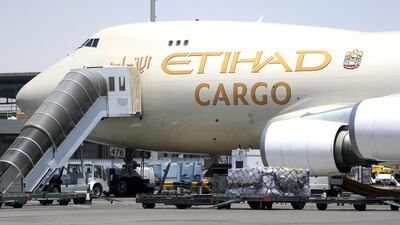Cargo volumes of Middle East carriers are expected to be hurt this year from increasing airline capacity that is outstripping demand amid the economic slowdown.
The Middle East carriers’ international freight growth rate of 6.5 per cent during the first half of this year was below the 14.3 per cent average growth for the same period last year, according to the International Air Transport Association (Iata).
“Cargo volume growth this year [for Middle East carriers] will slow down versus the performance seen last year due to an excess global air freight capacity as well as slower international commerce,” said Saj Ahmad, an analyst at London’s StrategicAero Research. “The impact of cheaper sea freight too impacts volumes as well.”
The lower volumes are inevitably hitting the cargo revenue.
“To date the Middle East carriers have seen less of a slowdown in cargo than many other airlines, but inevitably the overall low growth has an impact,” said Peter Morris, the chief economist at the UK-based Ascend Flightglobal Consultancy.
Global cargo revenue last year was US$52.8 billion and is forecast to be $49.6bn this year, according to Iata. It does not have region-specific figures.
“The low cost of fuel has seen a return to the market of less fuel efficient aircraft,” said David Kerr, the senior vice president for Etihad Cargo. “This additional capacity, combined with a slowing global economy, has put pressure on everyone’s yield.”
For Middle Eastern carriers, freight demand growth has eased over the past 12 months but remained higher than the passenger demand, according to Iata.
The regional airlines’ growth rate in revenue per passenger kilometres, a measure of the passenger demand, during the first half of this year was 10.6 per cent, according to Iata.
Since the global financial crisis of 2008, air travel has dramatically outpaced the cargo business.
“Over the past decade revenues in the passenger business have doubled,” said the Iata spokeswoman. “This year we expect cargo revenues to fall back to where they were 10 years ago.”
The region’s airlines’ freight tonne kilometres (FTKs), a measure of the revenue-making load in metric tonnes, was up by 8 per cent year-on-year. Revenue passenger miles (RPKs), a measure of the passenger demand, was up by 7.3 per cent. The growth rates were still higher than the global average for FTK increase of 4.3 per cent and RPKs increase of 5.2 per cent during the same period.
Emirates Airline’s SkyCargo unit, which carries a larger share of cargo compared with other regional airlines, has already reported a year-on-year fall of 9 per cent in cargo revenues to Dh11.1bn in the 2015/16 financial year, accounting for 13 per cent of total revenue.
Emirates is expecting 36 more aircraft deliveries in the current financial year.
“We constantly monitor market conditions to ensure that our cargo capacity is deployed to best serve customer needs across our global network,” said Nabil Sultan, the divisional senior vice president at Emirates SkyCargo, referring to adjustments in the airline’s cargo capacity.
It carried 2.5 million tonnes of cargo in its last financial year, a growth of 5.6 per cent, while its passenger figures increased by 7.7 per to 51.8 million.
“As long as the passenger market is growing and fuel prices remain in the range they are now, there is unlikely to be a threat to the Emirates profitability from the weakness of the cargo market,” said Mr Morris.
The slowdown in cargo volume growth is expected to have a bigger effect on the smaller regional players.
“In the wider Arabian Gulf, the slowdown will force some smaller and fringe players like Saudia, Royal Jordanian [and] Kuwait Airways to reel in their available capacity because they can’t effectively compete,” said Mr Ahmad.
Etihad Airways, whose cargo division accounts for around 17 per cent of the revenue, is expecting to grow this year.
“We are aiming to buck the trend in 2016 as we did in the 2015 financial year when Etihad Cargo recorded a 4 per cent year-on-year growth, outperforming the global market,” said Mr Kerr.
The airline carried 591,000 tonnes of cargo and mail last year along with 17.6 million passengers, an 18.9 per cent year-on-year increase.
Cargo volumes for the UAE airports also declined during the first half.
At Abu Dhabi International Airport, cargo volumes fell by 6 per cent year-on-year in the first half, while in Sharjah Airport cargo volumes fell by 15 per cent on the year earlier.
Passenger figures for Abu Dhabi and Sharjah airports grew during the same period at 6.6 per cent and 11.55 per cent, respectively.
At Dubai International Airport, passenger numbers grew at 7 per cent, while cargo volumes increased by 4 per cent in the first five months.
The drop in air cargo demand is coinciding with the oil price collapse.
“The underlying demand backdrop remains weak and there are few indications that a near-term turnaround in fortunes for industry-wide air freight is in the offing,” said the Iata spokeswoman. “Capacity growth for air cargo has continued to outstrip that of demand and this means sustained downwards pressure on revenues and yields. [There also] seems to have been a pause in globalisation.”
ssahoo@thenational.ae
Follow The National's Business section on Twitter

